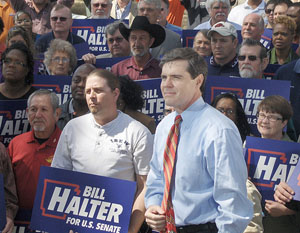Target and Best Buy have recently endured withering criticism from liberal activists for indirectly supporting an anti-gay Republican’s gubernatorial campaign. Spurred on by the Citizens United ruling, which opened up elections to unlimited corporate spending, Target, Best Buy, and other companies gave more than $700,000 to Minnesota Forward, a conservative group. Minnesota Forward went on to back GOP gubernatorial candidate Tom Emmer, a right-wing conservative who once supported a fringe Christian education group that condoned putting gay people to death. That led gay activists and grassroots groups, including MoveOn.org, to threaten to boycott the stores—both of which prided themselves for supporting gay rights. (Target insisted that it supports candidates on both sides of the aisle who agree with their business views.)
Now Minnesota Forward seems to be hedging its bets, endorsing three conservative Democratic candidates for the Minnesota state house. Last week, Minnesota Forward decided to support the three incumbents—Sen. Terri Bonoff, Sen. James Metzen, and Rep. Gene Pelowski—after having previously backed only Republicans.
The new endorsements may take some of the pressure off, but not all of it. Though he’s a Democrat, Pelowski is also a social conservative who, like Emmer, supported an amendment to define marriage as between a man and a woman. And one of the Democrats that Minnesota Forward endorsed seems wary of the backlash that Target and Best Buy have experienced. While she thanked the group for its endorsement, Bonoff also underscored her support for LGBT rights and her concern about the impact of Citizens United—even though she stands to benefit from it:
I am, however, concerned about the effect of the Supreme Court ruling in the Citizens United case, which opened the door to direct corporate spending in political campaigns. This new influx of money, combined with self-financing millionaire candidates, threatens to drown out the voice of the people who are supposed to be deciding our elections.
The Minnesota example shows some of the risks that corporations—and the candidates they support—could run by taking advantage of the campaign finance free-for-all. But while the beneficiaries of the ruling seem to be proceeding with a degree of caution for the time being, it’s still unclear whether they’ll ultimately decide that an activist-led backlash is a small price to pay for the opportunity to have an outsized influence on elections.
(h/t Firedoglake)









